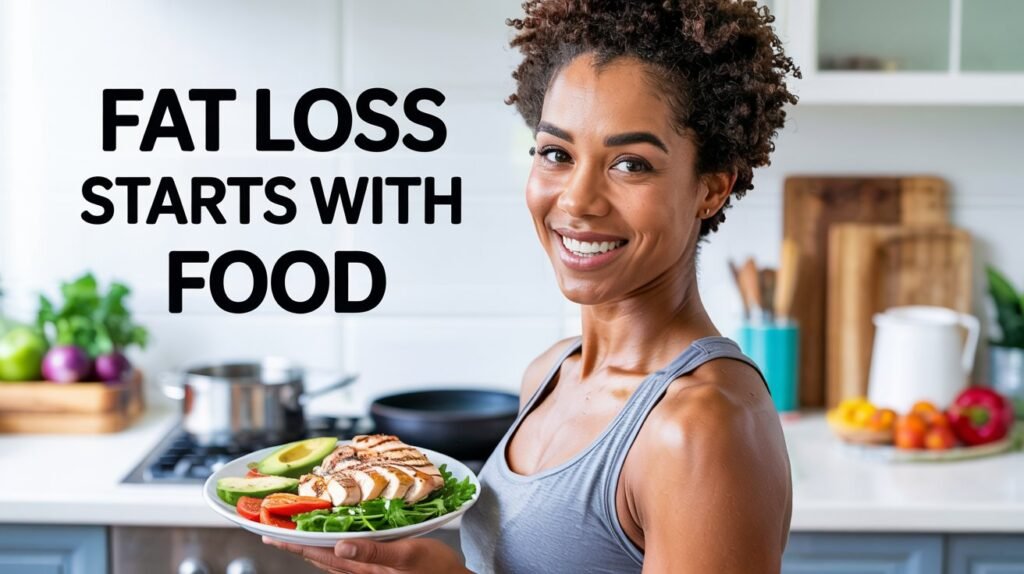Your first step toward healthy, sustainable weight loss starts here.
What Is Fat Loss – and Why It’s Different from Weight Loss?
Fat loss refers specifically to the reduction of body fat – not just losing weight on the scale. You could lose water or muscle weight and still appear unhealthy. Targeting fat, especially visceral fat (the kind that surrounds your organs), is what truly improves your health and body composition.
✅ Goal: Lose fat, maintain (or gain) lean muscle.
Calories: The Basics
Your body burns calories for energy. To lose fat, you need to eat fewer calories than you burn, creating a caloric deficit.
-
1 pound of fat = ~3,500 calories.
-
A daily deficit of 500–750 calories can lead to safe weight loss of 1–1.5 pounds per week.
But it’s not just about cutting calories — it’s about where those calories come from.
Macronutrients Matter
All foods contain three main macronutrients:
-
Protein
-
Carbohydrates
-
Fat
🥩 Protein
-
Why it matters: Preserves muscle, keeps you full longer.
-
Best sources: Chicken, turkey, fish, tofu, eggs, Greek yogurt, legumes.
🍞 Carbohydrates
-
Why it matters: Primary energy source. Focus on complex carbs.
-
Best sources: Whole grains, sweet potatoes, fruits, vegetables, legumes.
🥑 Fat
-
Why it matters: Essential for hormone production and vitamin absorption.
-
Best sources: Avocados, nuts, seeds, olive oil, fatty fish (like salmon).
✅ Aim for a balanced plate: 40% carbs, 30% protein, 30% healthy fat (this may vary per person).
Portion Control & Mindful Eating
You don’t have to eliminate foods you love — you just need to manage portions.
Tips:
-
Use smaller plates
-
Eat slowly, chew thoroughly
-
Stop eating when 80% full
-
Avoid eating in front of screens
Hydration Is Key
Sometimes your body confuses thirst with hunger.
Drink at least 8–10 cups of water per day, more if you exercise.
✅ Tip: Start meals with a glass of water to help with satiety.
What to Avoid (or Limit)
-
Sugary drinks (soda, sweetened coffee/tea, juice)
-
Ultra-processed foods (chips, fast food, packaged snacks)
-
Trans fats and excessive saturated fats
-
Late-night binge eating
These foods are often high in calories, low in nutrients, and easy to overeat.
Meal Timing: Does It Matter?
While total calories matter most, some people benefit from:
-
Eating every 3–4 hours to control hunger
-
Not eating too close to bedtime
-
Optional: Intermittent fasting, if medically appropriate
Talk to your doctor before making major changes to eating schedules.
Track Your Progress (But Don’t Obsess)
You can track:
-
Calories (via apps like MyFitnessPal)
-
Macronutrients
-
Measurements (waist, hips)
-
How clothes fit
-
How you feel (energy, mood, digestion)
Avoid daily scale obsession – weight fluctuates naturally. Weekly trends are more reliable.
Talk to a Professional
Before starting any major diet changes, it’s best to:
-
Talk to your doctor (especially if you have medical conditions)
-
Consult a registered dietitian for a personalized plan
Final Thought: Fat Loss Is a Lifestyle, Not a Quick Fix
Fat loss takes time, consistency, and patience. Crash diets may work short-term, but sustainable eating habits create long-lasting results.
✅ Focus on progress, not perfection.
